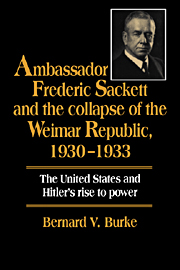Book contents
- Frontmatter
- Contents
- Acknowledgments
- Abbreviations used in the notes
- Introduction
- 1 A time of opportunity
- 2 American diplomacy, official and unofficial
- 3 The landslide election
- 4 Sackett takes the initiative
- 5 Sackett and the financial crisis
- 6 Perceptions of Nazism and communism, with an afterthought on fascism
- 7 One end, two paths: Brüning and Hitler in conflict
- 8 Efforts to sustain representative government in Germany
- 9 Sackett loses heart with Brüning's fall
- 10 The decline of Hitler and the Nazis
- 11 Through a glass darkly
- Conclusion
- Bibliography
- Index
8 - Efforts to sustain representative government in Germany
Published online by Cambridge University Press: 30 September 2009
- Frontmatter
- Contents
- Acknowledgments
- Abbreviations used in the notes
- Introduction
- 1 A time of opportunity
- 2 American diplomacy, official and unofficial
- 3 The landslide election
- 4 Sackett takes the initiative
- 5 Sackett and the financial crisis
- 6 Perceptions of Nazism and communism, with an afterthought on fascism
- 7 One end, two paths: Brüning and Hitler in conflict
- 8 Efforts to sustain representative government in Germany
- 9 Sackett loses heart with Brüning's fall
- 10 The decline of Hitler and the Nazis
- 11 Through a glass darkly
- Conclusion
- Bibliography
- Index
Summary
Ambassador Sackett continued to be optimistic about Chancellor Brüning's tenure in office in spite of ominous signs. The only solid support Brüning could count on was President Hindenburg, since he did not have enough backing in the Reichstag to form a majority government. Hitler's electoral success and Hugenberg's humiliating defeat positioned the Nazi as undisputed head of the political Right, placing Brüning in a precarious position. President Hindenburg clearly preferred a cabinet of the Right, a political alignment that could not be fashioned without Hitler's cooperation. The predicament was more problematic because Hitler was unwilling to enter any government he could not control. That impasse appeared to put Brüning on the brink of losing office.
Worse yet, his government was confronted with a demand from the heads of all the major German states that something be done about the Nazi Storm Troopers. General Wilhelm Groener, who as Reichswehr minister had authority over the army and simultaneously as minister of the interior was responsible for domestic police forces, was under strong pressure from provincial governments to put a stop to the domestic warfare being carried on by Nazi Storm Troopers. At stake was the only solid support, outside his own Center party, the chancellor could count on.
The Social Democrats remained the mainstay of the Weimar Republic and they had committed themselves to supporting Brüning. Still in control of Prussia, the Socialists exerted great pressure on the Reich government to outlaw the Storm Troopers. The Prussian prime minister and the head of the Interior Ministry vowed that Prussia would outlaw the Storm Troopers if the Reich government refused to act. Regional forces moved to action.
- Type
- Chapter
- Information
- Publisher: Cambridge University PressPrint publication year: 1995



